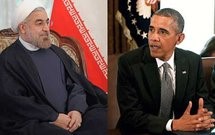 US President Barrack Obama's historic phone-call to Iranian President Hassan Rouhani on 27 September, coming as it does after over three-decades of frosty and, at times hostile, relationship has been widely hailed as an ice-breaking thaw.
US President Barrack Obama's historic phone-call to Iranian President Hassan Rouhani on 27 September, coming as it does after over three-decades of frosty and, at times hostile, relationship has been widely hailed as an ice-breaking thaw.
Preparations were apparently in place for an impromptu meeting between the two, as revealed by President Rouhani, but knowing the mind of the hardline clerics back home, he wisely avoided such a dramatic encounter in his first ever visit to the United Nations headquarters as President.
Nevertheless, it was significant that President Obama pushed for diplomacy, as he had promised in his pre-election manifesto of 2008, to resolve the oldest and seemingly intractable problem of American foreign policy.
He has indeed moved a long way from the threatening talk of "no options are off the table" to directly engaging the Iranian President. As per media reports of both sides, the talks were polite and cordial though the American President raised the release of three of his nationals held in Iranian prisons. That should be a minor issue for President Rouhani and probably the easiest one to address.
The main problem, the nuclear issue, will still remain intractable, but some very significant steps have been taken by President Rouhani back home to address it in ways different from his predecessor. Firstly, he reshuffled some of the top personnel in the Atomic Energy Organisation of Iran (AEOI) and put former Foreign Minister Abdullah Ali Salehi in charge of AEOI.
Then he transferred nuclear negotiations from the hardliners in the security establishment to the moderates in the Foreign Ministry, more precisely from Saeed Jalili, an ex- Revolutionary Guard, to the new Foreign Minister Mohammed Javaz Zarif, an US-educated veteran diplomat previously involved in secret Tehran-Washington talks. Saeed Jalili, who contested the recent Presidential elections and considered close to the Supreme Leader, was described by an Iranian Professor "as the most incapable Iranian diplomat since the Qajar dynasty (1779-1924), who never learned anything about diplomatic protocols except for his mistimed and misplaced smiles".
Electoral defeat of Saeed Jalili does not mean that the influence of hardline clerics and of the Revolutionary Guards has suffered a major setback. A country living under sanctions for over 30 years builds institutions and structures of power to end such isolation.
Smuggling of a whole range of goods and commodities becomes a legitimate activity to be done by a few institutions of State and those that are running them gain enormous power and wealth. That is how the Iranian Revolutionary Guards Corps (IRGC) that was initially set-up to support the regular Army during its 8-year war against Iraq in the early 80's grew up to be a crucial agent of State power to run a war ravaged, sanctions-afflicted economy.
From its humble origins, the IRGC has grown into a mammoth corporate power controlling the oil and gas industry, cement manufacturing, construction industry, electricity, telecommunications, trading, banking and finance sectors. It also controls the hugely profitable underworld business of smuggling cigarettes, drugs and alcohol. It controls smuggling out of oil to ports in Dubai as well as transferring it to other ships on high-seas, hawala transactions, control of forex trade and importing of high end luxury cars and all electronic items. With such vast economic interests, it naturally wields enormous clout over the political power structure that goes right up to the top.
In fact, former President Ahmadinejad, who felt checkmated by the Supreme Leader on several occasions vented out his anger at the Commanders of the IRGC and threatened to expose their nefarious activities. He had revealed that the IRGC controls over 300 jetties dotted all along the coastline through which they smuggle in and out billions of dollars worth of goods without any customs or immigration check. And this money does not enter the coffers of the State. He had also hinted that among the beneficiaries of the largesse of the IRGC was Mojthaba Khamanei, son of the Supreme Leader, who is known to have maintained bank accounts in Dubai and London.
The IRGC, being the 'Deep State' that has gained so much from the adversity of sanctions would not easily acquiesce to any policy shift that may put an end to the sanctions regime. President Rouhani's real challenge comes from that deep State. Will he be able to win over the Supreme Leader to yield concessions, though the latter has given him 'heroic flexibility', on matters that affect the economic interests of some of his closest advisors, possibly including his son?
No wonder that amongst the hundreds of jubilant supporters that greeted President Rouhani on his return to Tehran, after his telephonic talk with President Obama, there were some who attacked his motorcade with eggs and shoes. This is the shape of things to come. Not everyone in Iran wants his President to negotiate the country out of its present misery.
It is not only President Obama who feels boxed in by the Lindsay Grahams and John McCains of his country but Rouhani too has formidable set of foes to fight, before either can climb down from his stated position. Obama's situation is probably worse off, for he has to fight the enormous power of the Jewish lobby -- the AIPAC within and President Netanyahu from outside, not to mention the power of the Saudi lobby in Washington; all of who were hoping to end the nuclear program of Iran with a punishing military strike.
(Ravi Joshi is a Visiting Distinguished Fellow at Observer Research Foundation, Delhi)
By Special Arrangement with : Observer Research Foundation (www.orfonline.org)